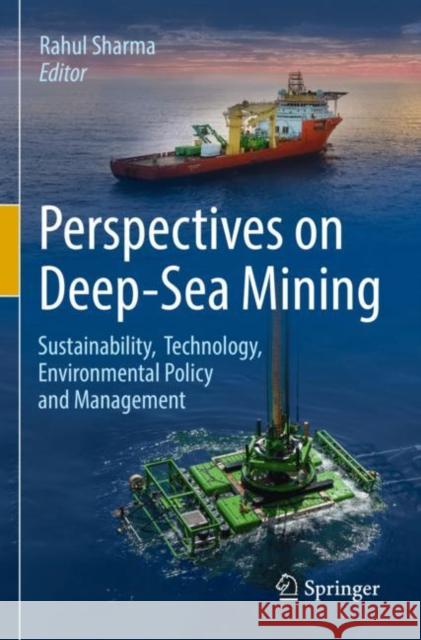Perspectives on Deep-Sea Mining: Sustainability, Technology, Environmental Policy and Management » książka
Perspectives on Deep-Sea Mining: Sustainability, Technology, Environmental Policy and Management
ISBN-13: 9783030879846 / Angielski / Miękka / 2023 / 689 str.
Perspectives on Deep-Sea Mining: Sustainability, Technology, Environmental Policy and Management
ISBN-13: 9783030879846 / Angielski / Miękka / 2023 / 689 str.
(netto: 624,92 VAT: 5%)
Najniższa cena z 30 dni: 616,85
ok. 16-18 dni roboczych.
Darmowa dostawa!
This book is a sequel to ’Deep-Sea Mining: Resource Potential, Technical and Environmental Considerations’ (2017) and ‘Environmental Issues of Deep-Sea Mining: Impacts, Consequences and Policy Perspectives’ (2019), and aims to provide a comprehensive volume on different perspectives of deep-sea mining from specialists around the world. The work is timely, as deep-sea minerals continue to enthuse researchers involved in activities such as ascertaining their potential as alternative sources for critical metals for green energy and other industrial applications, as well as technology development for their sustainable exploration and exploitation, while addressing environmental concerns. With a steady increase in the number of contractors having exclusive rights over large tracts of seafloor in the ‘Area’, i.e. area beyond national jurisdictions, the International Seabed Authority, mandated with the responsibility of regulating such activities, is in the process of developing a code for exploitation of deep-sea minerals. These, coupled with growing interest among private entrepreneurs, investment companies and policy makers, underscore the need for updated information to be made available in one place on the subject of deep-sea mining. The book evaluates the potential and sustainability of mining for deep-sea minerals compared to other land-based deposits, the technologies needed for mining and processing of ores, the approach towards environmental monitoring and management, as well as the regulatory frameworks and legal challenges to manage deep-sea mining activities. The book is expected to serve as an important reference for all stakeholders including researchers, contractors, mining companies, regulators and NGOs involved in deep-sea mining.
This book is a sequel to ’Deep-Sea Mining: Resource Potential, Technical and Environmental Considerations’ (2017) and ‘Environmental Issues of Deep-Sea Mining: Impacts, Consequences and Policy Perspectives’ (2019), and aims to provide a comprehensive volume on different perspectives of deep-sea mining from specialists around the world. The work is timely, as deep-sea minerals continue to enthuse researchers involved in activities such as ascertaining their potential as alternative sources for critical metals for green energy and other industrial applications, as well as technology development for their sustainable exploration and exploitation, while addressing environmental concerns. With a steady increase in the number of contractors having exclusive rights over large tracts of seafloor in the ‘Area’, i.e. area beyond national jurisdictions, the International Seabed Authority, mandated with the responsibility of regulating such activities, is in the process of developing a code for exploitation of deep-sea minerals. These, coupled with growing interest among private entrepreneurs, investment companies and policy makers, underscore the need for updated information to be made available in one place on the subject of deep-sea mining. The book evaluates the potential and sustainability of mining for deep-sea minerals compared to other land-based deposits, the technologies needed for mining and processing of ores, the approach towards environmental monitoring and management, as well as the regulatory frameworks and legal challenges to manage deep-sea mining activities. The book is expected to serve as an important reference for all stakeholders including researchers, contractors, mining companies, regulators and NGOs involved in deep-sea mining.











